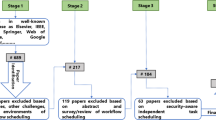Abstract
In last few decades, cloud computing has been established itself as a globally accepted platform even in security services needed in various domains having capacity to attain better performance. Security is emerging as an essential issue in IaaS cloud environment. The performance by reducing the number of failure tasks and average failure probability on cloud resources has been carried out in the domain of research to generate efficient schedule for virtual machines (VMs) allocation. Yet, the optimal schedule generation to process security-aware applications stands for a big challenge. So, many researchers have proposed various security-based models for the purpose and leaving scope for more models to be proposed because none of them is proven optimum in all respect. In this paper, a security-aware workflow allocation (SAWA) strategy has been proposed for workflow applications of tasks to machines mapping on cloud system by incorporating security overheads with aim of reduced number of failure tasks and average failure probability. It considers the security demand of tasks in the workflow and negotiating cipher suite between the tasks and machine in terms of security demand and trust level. The proposed strategy has been evaluated with comparative performance analysis to find the suitable place for it in the literature and established it better than its considered peer in the study.
Access this chapter
Tax calculation will be finalised at checkout
Purchases are for personal use only
Similar content being viewed by others
References
Alam M, Khan ZA (2017) Issues and challenges of load balancing algorithm in cloud computing environment. Indian J Sci Technol 10(25):1–2
Camati RS, Calsavara A, Lima Jr L (2014) Solving the virtual machine placement problem as a multiple multidimensional knapsack problem. ICN 2014 23:264
Suseela BB, Jeyakrishnan V (2014) A multi-objective hybrid ACO-PSO optimization algorithm for virtual machine placement in cloud computing. Int J Res Eng Technol 3(4):474–476
Shahid M, Raza Z (2014) Level-based batch scheduling strategies for computational grid. Int J Grid Util Comput 5(2):135–148
Forti A (2006) DAG scheduling for grid computing systems
Donoho G (2004) Building a web service to provide real-time stock quotes. MCAD Net 38–42
Song S, Kwok YK, Hwang K (2005) Trusted job scheduling in open computational grids: security-driven heuristics and a fast genetic algorithms. In: Proceedings of international symposium on parallel and distributed processing
Connelly K, Chien AA (2002) Breaking the barriers: high performance security for high performance computing. In: Proceedings of the 2002 workshop on new security paradigms. ACM, pp 36–42
Ahmad I, Kwok YK (1998) On exploiting task duplication in parallel program scheduling. IEEE Trans Parallel Distrib Syst 9(9):872–892
Barbosa JG, Moreira B (2011) Dynamic scheduling of a batch of parallel task jobs on heterogeneous clusters. Parallel Comput 37(8):428–438
Braun TD, Siegel HJ, Beck N, Bölöni LL, Maheswaran M, Reuther AI, Robertson JP, Theys MD, Yao B, Hensgen D, Freund RF (2001) A comparison of eleven static heuristics for mapping a class of independent tasks onto heterogeneous distributed computing systems. J Parallel Distrib Comput 61(6):810–837
Darbha S, Agrawal DP (1998) Optimal scheduling algorithm for distributed-memory machines. IEEE Trans Parallel Distrib Syst 9(1):87–95
Papadimitriou CH, Yannakakis M (1990) Towards an architecture-independent analysis of parallel algorithms. SIAM J Comput 19(2):322–328
Hwang JJ, Chow YC, Anger FD, Lee CY (1989) Scheduling precedence graphs in systems with interprocessor communication times. SIAM J Comput 18(2):244–257
Iverson MA, Özgüner F, Follen GJ (1995) Parallelizing existing applications in a distributed heterogeneous environment. In: 4th heterogeneous computing workshop (HCW’95)
Topcuoglu H, Hariri S, Wu MY (2002) Performance-effective and low-complexity task scheduling for heterogeneous computing. IEEE Trans Parallel Distrib Syst 13(3):260–274
Sih GC, Lee EA (1993) A compile-time scheduling heuristic for interconnection-constrained heterogeneous processor architectures. IEEE Trans Parallel Distrib Syst 4(2):175–187
Xiaoyong T, Li K, Zeng Z, Veeravalli B (2010) A novel security-driven scheduling algorithm for precedence-constrained tasks in heterogeneous distributed systems. IEEE Trans Comput 60(7):1017–1029
Song S, Hwang K, Kwok YK (2006) Risk-resilient heuristics and genetic algorithms for security-assured grid job scheduling. IEEE Trans Comput 55(6):703–719
Kashyap R, Vidyarthi DP (2012) Security-aware scheduling model for computational grid. Concurr Comput Pract Exp 24(12):1377–1391
Zhu H, Wang Y (2008) Security-driven task scheduling based on evolutionary algorithm. In: 2008 international conference on computational intelligence and security, vol 2. IEEE, pp 451–456
Shahid M, Raza Z, Sajid M (2015) Level based batch scheduling strategy with idle slot reduction under DAG constraints for computational grid. J Syst Softw 108:110–133
Gupta S et al (2019) Tier application in multi-cloud databases to improve security and service availability. In: Handbook of research on cloud computing and big data applications in IoT. IGI Global, pp 82–93
Acknowledgements
This work is supported by the grant from UGC-BSR (Research Startup Grant with sanction No. F.30-377/2017 (BSR), Code-10057/B30528) to Dr. M. Shahid. Authors are also thankful to Dr. Zahid Raza, SC&SS, JNU, New Delhi, for his valuable suggestions and support needed to accomplish this work.
Author information
Authors and Affiliations
Corresponding author
Editor information
Editors and Affiliations
Rights and permissions
Copyright information
© 2021 Springer Nature Singapore Pte Ltd.
About this paper
Cite this paper
Shahid, M., Alam, M., Hasan, F., Imran, M. (2021). Security-Aware Workflow Allocation Strategy for IaaS Cloud Environment. In: Purohit, S., Singh Jat, D., Poonia, R., Kumar, S., Hiranwal, S. (eds) Proceedings of International Conference on Communication and Computational Technologies. Algorithms for Intelligent Systems. Springer, Singapore. https://doi.org/10.1007/978-981-15-5077-5_22
Download citation
DOI: https://doi.org/10.1007/978-981-15-5077-5_22
Published:
Publisher Name: Springer, Singapore
Print ISBN: 978-981-15-5076-8
Online ISBN: 978-981-15-5077-5
eBook Packages: Intelligent Technologies and RoboticsIntelligent Technologies and Robotics (R0)




